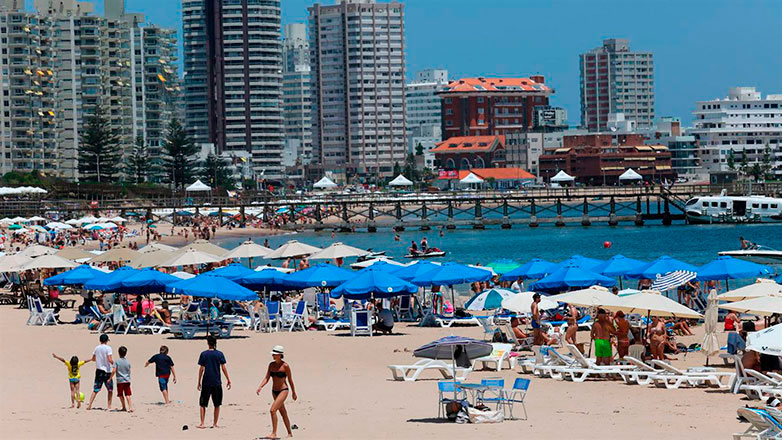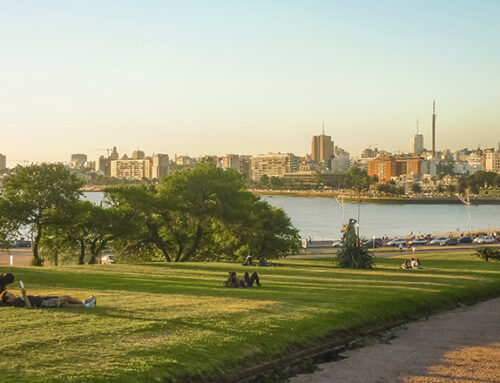Uruguay has maintained a constant economic growth from 14 years. In 2016 it experienced a 1,2% rise, despite falls in Argentina (-2.5%) and Brazil (-3.5%). Also, Uruguayan exports to its Mercosur neighbors went from being a half of its total exports to one-fifth.
Finally, Uruguayans feel that they achieve to liberate their economy from the fluctuations of its two big neighbors, Brazil and Argentina. Decades walking hand in hand with the two Mercsur giants and now is time to celebrate a significant decrease in its dependence.
A country that made its own path
The Tabaré Vazquez administration could achieve a humble growth (about 1.2%), which is more valuable comparing recessions and crisis in Brazil and Argentina. The Uruguayan economy closed 2016 with better than expected results and continues a process started in 2003 during the government of Jorge Batlle. “To be self-indulgent would be a big mistake, but we have to admit that the tendencies changed in a positive way”, said Danilo Astori, ministry of finances, to the Argentinean newspaper La Nación.
Astori was minister of finances during the first period of the center-left coalition Frente Amplio administration (2005-2010), vice-president during the second (2010-2015) and again finance minister during this period. On one way or another he was the chief of finances during those three periods. All along with Vázquez and with the foreign affairs minister Rodolfo Nin Novoa they work in a plan to broaden the country’s international insertion, with the pursuit of free trade agreements with the Pacific South-American region, Europe and China.
Economist Gabriel Oddone, from the consulting firm CPA Ferrere, said that “The numbers suggest that 2016 ended being better than expected, but the changes in the international scene challenge the recuperation in 2017”. He said that the economy is going towards “a world where the US monetary policy is going to normalize faster tan expected and Uruguay is relatively well prepared for that, because it improved its public finances in the past year. But for Argentina and Brazil it will be a problem and that affects the region. Uruguay will continue to growth, not much, but still growing”.
But this withdrawal from the region that the Vazquez administration celebrates does not satisfy everyone. The left bloc, which are majority in the Frente Amplio and have their more visible leader in José “Pepe” Mujica, reject this strategy and demand that Uruguay stays close to the region. Communists, tupamaros, orthodox socialists and other groups defend the concept of South America as the “Big Homeland” (Patria Grande), but the defeats of the “kirchnerismo” in Argentina, the impeachment of Dilma Roousseff in Brazil and the crisis in Venezuela, damaged the politic plans of these groups.
Pablo Ferreri vice-minister of finances, said to La Nación: “for our country it’s fundamental that we can sustain and intensify the cycle of economic and social growth we are experiencing from 14 years, in which social inclusion is a pillar”. In that sense the economic team will continue to promote investments and searching for commercial agreements, widening markets. “Uruguay doesn’t have a rigid or dogmatic model, it has an strategic path” –said Ferreri.
Regarding commerce and the withdrawal or not from the region he said: “In that scheme the international insertion is key for a little country like Uruguay, as much as for obtain productive investments –for services and goods, which generate good remunerated jobs- as for achieving exports.
The vice-minister said that Uruguay wants to fulfill “the search for commercial agreements with the Mercosur as a launch platform”. In the administration there is a certainty that the country can’t wait for its partners to progress at the same time, and Uruguay has to lead this strategy. “In a disrupted world, the most solid path to progress is to strengthen the regional integration processes” said Astori, but added: “We have to work hard to strength the regional processes, but this can’t be an end way for the country’s international insertion. We are trying that the Mercosur could be a launch platform”.
The path to independence
The inhabitants of the Banda Oriental that between 1828 and 1830 turned to be a independent country as a result of the peace agreement between the Brazilian Empire and the Argentinean provinces, were tied to these countries; politically independent but economically dependent. But now, while its neighbors are trying to escape from recession, Uruguay has a years of constant and unprecedented growth of its GDP.
Also, Uruguayan exports to Argentina and Brazil went from being half the total sales to less tan one-fifth. In 1998 the 52.3% of Uruguayans exports were to Argentina and Brazil, while in 2015 and 2016 they were 19.9%. Meanwhile China turned to be the main buyer of Uruguayan products. But, if we count services as tourism, the weight of Argentina is still very important.
Uruguay experienced between 2004 and 2014 the biggest economic prosperity of its history. Official statistics and studies made by specialists in economic history allow having registers from 1870. Before that the country lived traumatic periods trying to consolidate the republic. According to these studies, the actual period is the longest in economic growth.
Computing per capita GDP between 1916 and 1924, including a year of zero growth (1920), the period achieved nine years of constant growth. Between 1944 and 1954, despite that in 1951 it was no growth, the period lasted 11 years. But from 2004 to 2016 we have 13 years of GDP growth and if we count this year projections the growth will be 14 years long.
But the path was not easy. Drove by the wind in its neighbor countries, Uruguay stopped a period of growth at the end of the 1990’s. Argentina entered recession in the last trimester of 1998 and this happened in Uruguay too. In 1999 there was a crack in Brazil’s exchange rate, which aggravate the regional recession. The 2001 Argentinean financial crisis was reproduced in Uruguay in 2002. At the end of 2003 the Uruguayan economy started to rise. That year the GDP was slowly positive (+0.8%).
2004 was the last of the Jorge Batlle administration and it ended with a 5% growth, which continued in the first Vázquez administration (7,5% in 2005; 4,1% in 2006; 6,5% in 2007; 7,2% in 2008 and 4,2% in 2009). In the second Frente Amplio administration, with Mujica as president, the GDP continued to rise: 7,8% in 2010; 5,2% in 2011; 3,5% in 2012; 4,6% in 2013 and 3,2% in 2014.
Vázquez assumed its second administration (the third for the Frente Amplio) in a context of economic downturn and he take measures to fight a government deficit he considered disturbing. 2015 showed an improvement but very light, only 1%, enough to extend the cycle. En 2016 the recession fear was cleared and with the push of the second half of the year the tendencies indicates an improvement. And 2017 started with a record of summer tourists. Also, with a more equalitarian income distribution than others countries of the region, the growth was spread in all the social groups. Poverty reduces from a 40% in 2004 to less than 10% in 2015. The economic slowing-down stopped the improvement of these social indexes.
In the last year unemployment increased, but without reaching high levels: the annual average was 6.6% in 2014, it rises to 7.5% in 2015 and 7.9% in 2016. Inflation was controlled a the end of the year and closed in 8.1%, less than the 11% that was in the fall, but still out of the official target that is from 3% to 7%. The actual wage experienced a big growth, with an annual tax of 4.2% between 2005 and 2014, but it loosed strength, with a rise of 1.6% in 2015 and 1.4% in 2016.
Despite the GDP constant growth there are various sectors with problems like the manufacture industries, commerce and parts of the farming. Because of that the Uruguayan president insists in open new markets and obtain new investments. Recently the foreign affairs ministry announced that Vázquez will visit Germany, Finland and Russia in February to “intensify” the trade agreements with these nations. Another step in the “withdrawal” from their neighbors.
The business vision
For economist Pablo Rosselli director of Deloitte in Uruguay, an inquiry made by the consulting firm among the main companies of the country shows that from the majority of them “the worst has passed”, in relation with the deceleration and standstill of different sectors. “There are companies that still say that the situation of the company and the country is worst tan the year before, but they are less now. And we observe more favorable answers about the country perspectives for the next year”.
Source: La Nación





